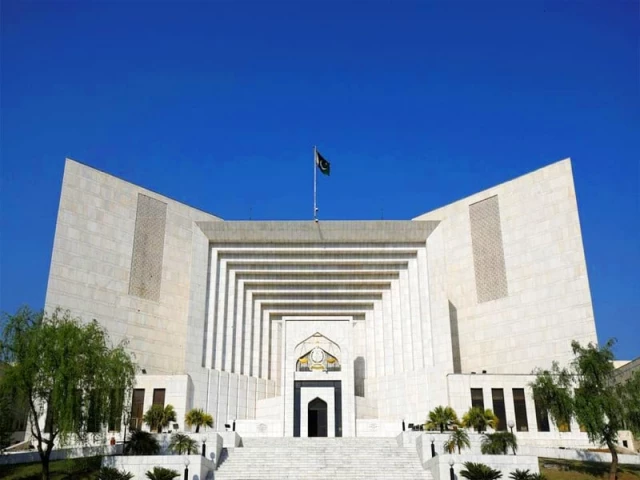SC accelerates death penalty case disposals
Lawyers decry inaction, lack of rules and executive sway over constitutional benches.

While the performance of constitutional benches at the Supreme Court remains underwhelming, the top court under Chief Justice of Pakistan (CJP) Yahya Afridi has achieved unprecedented acceleration in disposing of criminal cases, particularly those involving death sentences.
According to the SC statement, 238 death sentence appeals have been decided during CJP Afridi’s tenure.
When he assumed office, 59,435 cases were pending in the apex court, which then comprised 16 permanent and two ad hoc judges. As of May 20, the number of working judges has risen to 25, and the case pendency has been reduced to 56,715.
Since October 28, 2024, the court has disposed of 238 death sentence appeals, over 52% of the 454 total cases. At the start of Afridi's tenure, 410 death sentence appeals were pending.
With 44 new appeals instituted since then, the number rose to 454, but rapid fixation and disposal have brought it down to 216. By comparison, only 26 such appeals were resolved during the corresponding period a year earlier.
The SC statement credits this turnaround to the CJP’s strategic focus on long-pending cases and the extension of working hours to hear them.
Three dedicated benches were constituted and worked on over several consecutive weeks. The first bench, headed by Justice Athar Minallah and comprising Justice Irfan Saadat Khan and Justice Malik Shahzad Ahmad Khan, is learnt to have decided 125 appeals in April alone.
The second bench was led by Justice Muhammad Hashim Kakar, with Justice Ishtiaq Ibrahim and Justice Ali Baqar Najafi. The third bench, chaired by Justice Naeem Afghan, included Justice Salahuddin Panhwar and Justice Aamer Farooq.
"The judges comprising these benches convened prolonged sittings, frequently extending beyond normal court working hours. The unwavering commitment of Hon’ble Judges has culminated in the huge disposal of all death appeals instituted up to 2024. The Court will now proceed as next phase to the cases of life-imprisonment appeals, preferential hearing such cases where the convict has already served two-thirds of the sentence—an approach designed to afford prompt relief to deserving appellants while reinforcing public confidence in the even-handed administration of criminal justice."
The apex court acknowledged the cooperation of counsel, prosecutors, prison officials and families.
"Their patience and professionalism resulted in this progress. Their combined commitment demonstrates that, with focused and collaborative resolve, the justice system can translate in commendable output," the statement said.
Report on CBs demanded
However, lawyers argue that it is essential to release a performance report on the constitutional benches (CBs), functioning after the 26th Constitutional Amendment.
The judges serving on these CBs have yet to evolve any rules or procedures for their operation. Notably, even a CB judge, Justice Jamal Khan Mandokhail, has raised concerns about the absence of regulations.
At the same time, the superior judiciary under CJP Afridi is confronting what many call its most significant challenge: executive influence over the nomination of CB judges and judicial appointments.
Although CJP Afridi has prioritised the reduction of case pendency, he has so far been unable to devise a strategy to counter the executive’s role in appointments. According to some legal observers, around 90% of judicial appointments are currently backed by executive authorities.
Commenting on the performance of SC judges, Advocate Abdul Moiz Jaferii noted: "These are great numbers. But the only number that counts is the majority of the executive in the judicial commission.”
“It is with this number that the meaning of justice has been reduced in our country. There is no independent judicial organ. The challenge to this usurpation of a pillar of the state remains pending. Until the question of the sanctity of the constitution is settled, these numbers are meaningless."
As for the performance of the constitutional bench, he added, “As far as the constitutional bench is concerned, the less said the better”.
“We were told they were assembled to give us efficient and competent adjudication. After six months of doing almost nothing, we have only the military courts decision being overturned as proof of their mastery. Even that decision comes without any details yet afforded.”
“We are on our way to reviewing the reserved seats case without asking why the petitioner seeking review has decided not to implement it. With a bench which lacks the author judge and is headed by the author of a dissenting opinion which the majority had censured,” he added.
“When the lawyers of today tell their stories tomorrow, the period in which the 26th amendment was in vogue and these constitutional benches were functioning will be remembered as little more than a bad joke."
Lawyers stress that the time has come for SC judges to unite in defence of judicial independence, instead of prioritising personal objectives.






















COMMENTS
Comments are moderated and generally will be posted if they are on-topic and not abusive.
For more information, please see our Comments FAQ